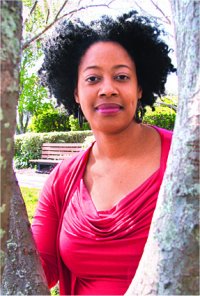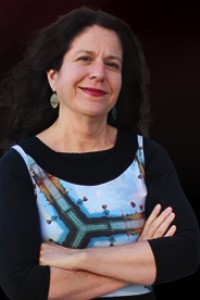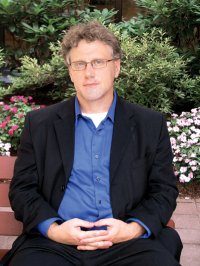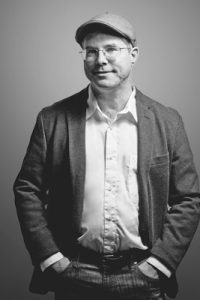N.K. Jemisin: Rites of Passage
 Nora K. Jemisin was born in Iowa City IA, and grew up spending summers in New York City and the rest of the year in Mobile AL. She studied psychology at Tulane in New Orleans, and went to grad school to study counseling at the University of Maryland-College Park. After spending ten years in Massachusetts, she moved to New York City, where she now lives and works as a career counselor.
Nora K. Jemisin was born in Iowa City IA, and grew up spending summers in New York City and the rest of the year in Mobile AL. She studied psychology at Tulane in New Orleans, and went to grad school to study counseling at the University of Maryland-College Park. After spending ten years in Massachusetts, she moved to New York City, where she now lives and works as a career counselor.
Jemisin attended the Viable Paradise workshop in 2002. Her short fiction began to appear in 2004, and she has since published about a dozen stories, including Hugo and Nebula Award finalist ‘‘Non-Zero Probabilities’’ (2009). First novel The Hundred Thousand Kingdoms (2010) begins the Inheritance trilogy, with The Broken Kingdoms due later this year and a final volume, The Kingdom of Gods, forthcoming. She also contributes to The Angry Black Woman blog and feminist blog Alas, A Blog.
‘‘I wrote a novel while I was in grad school, and sent that off to a slushpile at a publishing house that held it for a few years, and then finally rejected it. I was not at all connected with the genre community at that time, so I didn’t realize this was normal. I wrote another novel, sent that off, got my rejection, was horribly depressed….
‘‘Then I decided to go to Viable Paradise, where I got the counseling I needed: somebody telling me, ‘This is what you need to do to break in.’ They don’t concentrate on craft there, since it’s only a week long; they concentrate on professionalism and career, on, ‘This is what you need to transition from amateur to professional, and to stay a professional.’ They also told me that I should start trying to write short stories.
‘‘I had written nothing but novels and I could not think short. But as I had the sense knocked into me at VP, I realized stories and novels are different but complementary art forms, and there are reasons to learn from both. Writing short stories could improve my novel writing. So I thought, ‘Why not?’
‘‘But I had never really read short stories, except for the Golden Age stuff, which didn’t do much for me. When I started reading more modern things, I discovered I actually liked short stories! So I started writing some and got them published, thinking, ‘This is not what I want, but it’s really cool.’ ”
…
 “‘The Hundred Thousand Kingdoms is set in a world where human beings have managed to enslave several of their own gods. And the gods are not happy about this (to say the least). The story focuses on a young woman who is a member of the family that controls these gods and has used them to gain power over the whole world. Yeine is estranged from the family, but she’s been drawn back into it at their enclave called Sky, and into the family drama and politics. At the same time, she’s also become involved in the gods’ politics, which are a still-ongoing saga. So she ends up having to balance the human politics against the politics of the gods.
“‘The Hundred Thousand Kingdoms is set in a world where human beings have managed to enslave several of their own gods. And the gods are not happy about this (to say the least). The story focuses on a young woman who is a member of the family that controls these gods and has used them to gain power over the whole world. Yeine is estranged from the family, but she’s been drawn back into it at their enclave called Sky, and into the family drama and politics. At the same time, she’s also become involved in the gods’ politics, which are a still-ongoing saga. So she ends up having to balance the human politics against the politics of the gods.
‘‘The original version was a typical epic fantasy – different chapters told from different characters’ perspectives so you could see the big picture, side trips to other countries, a heavier emphasis on getting the Item of Importance to the Location of Significance – much more traditional in structure. When I started rewriting it, I thought, ‘I’m just going to write the way I feel like writing.’ It might not be epic fantasy anymore, if epic fantasy requires those tropes, but I was changing everything anyway, so I decided just to see what would happen.
‘‘When I found myself using this bizarre sort of stream-of-consciousness storytelling technique with Yeine as narrator, I was seized with anxiety: Is this actually publishable? I’d seen some really beautifully written stuff like it coming out of small presses, but I didn’t want to go the small-press route; I wanted mainstream publication. The first few chapters have all these ‘little winks’ and asides, and they’re more nonlinear. Despite my effort to write commercial, I quickly realized, ‘Never mind epic fantasy, this isn’t going to be the typical fantasy novel, period.’ So much for blatant commercialism.
“I finished it and sent it to my agent thinking, ‘What the hell am I doing? This thing has no chance of getting published now. I’ve made it worse.’ Ten days later she said, ‘There’s more than one offer.’ The novel went to auction. I was at work that day, and that whole day she was giving me phone calls, and I would have to close the door to my office and scream.”
…
“The way we write traditional epic fantasy now is making the whole genre look bad. I’ve heard so many people who read my book say, ‘I stopped reading epic fantasy years ago, but I liked this. It doesn’t feel like those epic fantasies.’ I think what they’re saying is that the genre has become so formulaic that it’s almost stagnant. I’m tired of fantasy medieval Europes in general, but what really bugs me are bad medieval Europes. … There’s no reason for medieval Europe-based fantasies to be as boring as they are. It’s time to shake things up.”



 Excerpts from the interview:
Excerpts from the interview:



Pingback:Tweets that mention Locus Online Perspectives » N.K. Jemisin: Rites of Passage -- Topsy.com
Pingback:The Great Geek Manual » Geek Media Round-Up: August 19, 2010
Pingback:Geek Media Round-Up: August 20, 2010 – Grasping for the Wind
Pingback:Fantasy Blogosphere: August 22, 2010 | Fantasy Book News
Pingback:Fantasy: we can do better « Purposefully Backwards
Pingback:史上初のヒューゴー賞長編小説部門3連覇! 黒人女性SF作家 N・K・ジェミシンとは誰かVG+ (バゴプラ) | VG+ (バゴプラ)